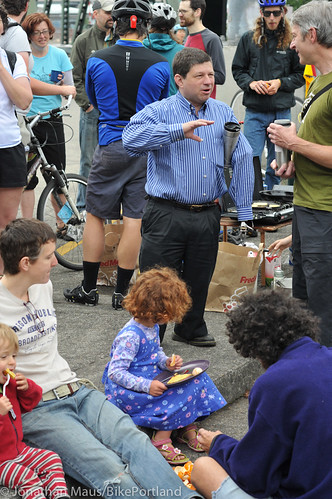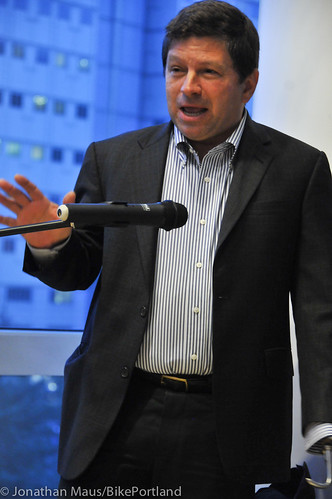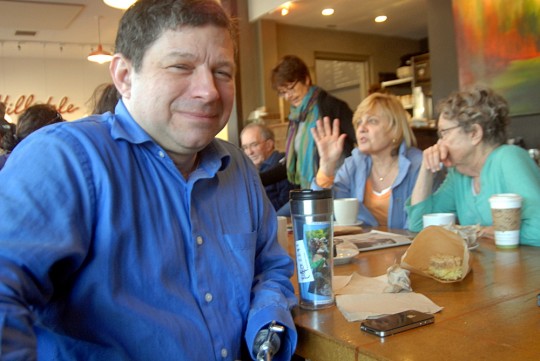
(Photo: M.Andersen/BikePortland)
When Portland’s transportation commissioner arrived in town, he was almost a caricature of a newcomer to the Northwest.
As a young East Coast professional in 1990, he came through the city for business and fell for its walkable downtown and its affordable urban setting. A lifelong tenant with no desire to buy a house or even know his neighbors, the former federal environmental lawyer moved into a home next to a Southeast Portland bar and started getting into local politics.
It was 20 years later that three things tugged him to Southwest Portland’s Multnomah neighborhood. They might sound familiar to many recovering east-siders.
He fell in love.
He got a dog.
And he was on a budget.
To cap our Southwest Portland week, we met one of its most famous residents: the city’s top transportation official. Commissioner Novick met us Friday morning at the Baker & Spice bakery in Hillsdale to get away from policymaking and talk about the things that matter to him as a Portlander and a person: how he gets around, where he hangs out, how he makes decisions and how he’s somehow become the sort of person who regularly goes to his neighbors’ house for dinner.
You grew up outside Eugene. What brought you here to Portland?
I was working in Washington D.C. and we actually sued the Port of Portland. I came out because of that and looked around downtown and said, wow, this is a really nice city. That was in 1990.
What was it that set the city apart then?
The downtown. It was the fact that there was a lively downtown, which at that point was really rare in the United States.
And you lived in the Sellwoodish area for a while after moving here, right?
I was right next to the Skybox pub. Sometimes the phone lines would get crossed and I would get calls to the Skybox.
Why’d you choose there?
I just needed somewhere to live.
And what brought you to the west side?
Well, first I moved in with [his now-wife] Rachel, to almost the same place, from Sellwood to Westmoreland. I never would have thought about buying a house, but she wanted a dog. I thought that would be OK. We were very eastside people, and we looked around various eastside places and it was incredibly expensive.
I’ve always assumed that the west side is still more expensive than the east side. Someone told us we should look in Hillsdale or Multnomah Village. I was like, that’s not possible, the west side is really nice! One of those days, I moved the cursor from one of those real-estate websites across the river just to see. And one of the first properties I saw was actually the place we live now. It’s actually almost as expensive because the taxes are higher, because of Measure 50. But I’d much rather pay my money to the city and the county and the schools than to the bank.
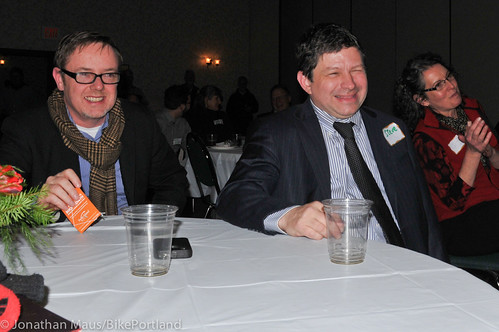
(Photo: J. Maus/BikePortland)
How often do you usually drive and how often do you take the bus?
Usually I’ll ride with Rachel. She drives, drops me off and then goes to the county, which is where she works. Sometimes I take the bus a couple of times a week in, and sometimes I take it back.
Are you the only council member who regularly gets to work without a car?
I don’t know. No, Nick [Fish] does now! He gave up his car. I mean, they still have a car but it’s not a two-car household. I think he rides his bike some, too.
What are your hangouts?
This is one of them – to be honest, I like Starbucks coffee better. We love the fact that there’s actually a video store here. I love Annie Bloom’s. I love just hanging out in the Village. We have breakfast at Fat City at least once a month. And occasionally, I confess, we do go to a movie theater in Tigard.
How is being a politician different than being an advocate?
As an advocate, you get to pick and choose what decisions to make. As a politician you have to make choices all the time about things that you didn’t initially have opinions about. And you have to vote! So inevitably you disappoint a lot more people than as an advocate.
Advertisement
Do you have a system, like a decision tree or something, for how to make policy judgments?
Not really.
So how do you figure out what to do?
There are some things where you know where you’re going to be no matter what. I have a fantastic staff, and they’re really good at summarizing things for me. Sometimes I will just tell them to make a decision. You’re much better informed than me, so you decide. It’s a judgment call, and I trust their judgment.
If it’s my bureau, I try to talk to as many people as possible. Like with the Foster road diet. It struck me as probably a good thing, but I wanted to make sure that we consulted with lots of people who would be affected.
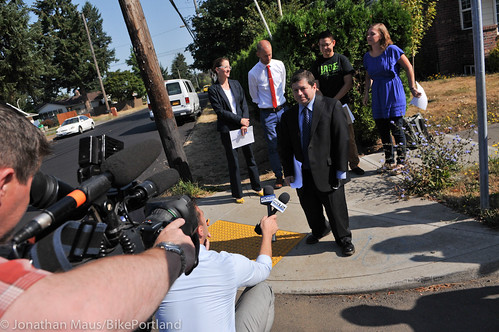
(Photo: J. Maus/BikePortland)
Have you ever been involved in a neighborhood association?
Oh, no. (Laughs.)
What’s your thinking about the neighborhood association system?
I think it probably works differently depending on where you are. There’s a larger number of people involved in some areas than others. There’s probably more representative groups in some areas than others. Not everybody is going to show up at a neighborhood association meeting.
We had an interesting discussion last week. We were talking about the West Quadrant plan, which sets the height limit of the buildings in Goose Hollow. The Goose Hollow Neighborhood Association said they wanted a lower limit. Then the previous Goose Hollow board came up and said the opposite. The new board said yes, these people are tools of the developers and we have ousted them in an election!
I finally asked how many people voted in that election. They said about 80. I asked how what the population of Goose Hollow was.
And they said, “80’s a lot! Usually it’s like 20!” I said, I’m sure that’s true.
Sometimes I think that neighborhood associations make outreach easy, but they also make it too easy to check the “outreach” box.
Well, 99 neighborhood associations are a lot, so it’s not that easy. What you have to do is talk to the neighborhood associations and then talk to other people too.
Do you plan to stay in your current neighborhood for a long time?
Oh, yes. We have really great neighbors. I’ve never been in a place before where I knew my neighbors at all. We didn’t know this when we moved in, but our house had been part of a progressive dinner that went from house to house.
Wow.
…which started 50 years ago! We live in Mayberry.
What changes would you like to see in Multnomah Village? Or maybe you’d rather not see changes?
I think it’s fantastic the way it is. There’s a new pizza place going in that we’re looking forward to. It would be ideal if there was a Zebra or something going in there – having a little grocery store would be nice.
I doubt their level of density is going to change all that much. It’s easy for me to say, but I wouldn’t mind more people being able to take advantage of the Village, if there were more multifamily housing around.
If you wind up on the council for a few cycles, which other bureaus are you interested in?
All the bureaus are interesting. I have exactly the bureaus I want.
I wanted to have either fire or 911 because health-care cost is such a big deal, and those are part of the larger health-care system. [Novick runs the emergency response bureau as well as PBOT.] And transportation: I asked the mayor, look, transportation, it’s critical to people’s daily lives. It’s critical to health care costs and climate disruption. And fortunately, the things we can do to improve people’s health are the same things that we can do to prevent climate disruption.
I also had a sense that because Portland is seen as a leader in transportation, it would have lots of people who knew about it. And that is obvious here. It kind of reminds me of when I worked for the Justice Department. The quality of people in the EPA regional offices varied widely. Frankly, the most talented people in Dallas want to work for an oil company, whereas in Seattle the most talented people want to work for the environment.
You talk about health care as one of your reasons for being interested in transportation, too.
It’s a financial issue. We spend 18, 19 percent of our GDP on health care, compared to 11 percent for other industialized countries. We spend 2 perent of GDP on infrastructure, compared to 5 percent in Europe and 9 or 10 percent in China. If you could take 7 percent of GDP and move it from health care to infrastructure, to education, to other things, you could have a much healthier country.
It’s sort of a cliché in local government now that local government is more functional than the federal government. And I look at the federal government and I’m just in complete despair, while in local government people are still, you know, sharing ideas with each other. You wanted to be in the Senate. Did you dodge a bullet by not getting into this Congress?
In some ways yes, but it’s going to take federal action to solve the problems. But yeah, right now it’s impossible.
Two encouraging things I’ve seen in the last few weeks, both in the New York Times. First, a majority of Republicans think we should do something about climate change. It may not be the activist Republicans, but it’s something. Also, a really solid majority of Hispanics think climate change is really problematic. Those are actually two of the best things I’ve seen in the last two years.
Qs & As edited.
-Well folks, that pretty much wraps up our SW Portland Week. But wait! We’ve still got full cameras and notebooks. Yes, time has run out on the week, but we’ll never stop covering SW Portland. Stay tuned next week, and the week after that, and the week after that, for more of our perspectives — and yours — on this fantastic part of our city.
Correction 2/17: Due to a transcription error, a previous version of this article misquoted Novick on the amount of GDP spent on infrastructure in Europe.

